Steve Williams was one of the most amazing characters in OU sports and professional wrestling history. What you saw in the ring as Dr. Death was pretty much what you saw outside the ring with Steve Williams. In fact, at some point, Steve Williams basically ceased to exist and there was only Dr. Death.
His collegiate exploits were legendary and he may have been most well known in college for a wrestling match that he lost at Gallagher Iba arena in the Bedlam dual, helping make a name for an obscure 400-lb heavyweight named Mitch Shelton and almost tearing the roof off the building in the Cowboy fans’ post match celebration.
Williams turned pro as a wrestler while he was still playing football at OU, and became a revered and reviled figure around the world, especially in Japan. He battled throat cancer, helped current WWE star and former OU football player/wrestler Jake Hager (Jack Swagger) get started, and found God.
I spoke to Dr. Death about his trials and tribulations in 2008. Sadly, just a year later, the cancer returned and he died in a Denver hospital in December 2009.
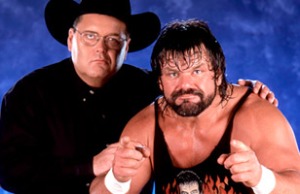
He came to Oklahoma already in possession of one of the most colorful nicknames in the history of sports and he left with a fistful of championship rings. But that was just the start of the story of the man they call “Dr. Death”. As a professional wrestler, former Sooner football player and wrestler Steve “Dr. Death” Williams has fought many opponents around the world and he has conquered just about all of them including the most deadly of them all – cancer.
Williams arrived at OU in 1979 from Lakewood, Colorado, where he was a highly recruited lineman and a champion wrestler. He obtained his nickname after an incident in a high school wrestling match.
“I shattered my nose about a hundred times and they had to keep stopping the match, so the coach from another school gave me an old time hockey goalie mask and when I put that on, my coach yelled out “Dr. Death”,” said Williams. “Reporters from the newspaper picked it up. I wasn’t like “Stone Cold” Steve Austin (whose real name also happens to be Steve Williams) or the “The Rock” who got a nickname for being an entertainer; I got a nickname for being a tough guy on the mat.”
“I didn’t have to give Vince McMahon a big house because he made up the name. I already had the name, I did all my bookings and I was my own agent, so it came out really well”
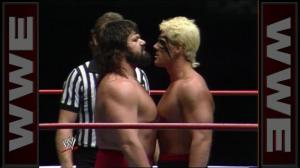
And that nickname gradually became the only name Williams knows. Most of his fans probably don’t know his real name and even he doesn’t recognize it most of the time.
“It’s not Steve Williams. When people say Steve, I don’t even hear that word anymore, it’s usually “Doc” or “Dr. Death” and I think they usually remember the name “Dr. Death”,” said Williams. “There are always some wanna be’s that came out of there like (Brian) Bosworth who wanted to be a Dr. Death. I was already there and conquered the Sooner football field and I think they remember me as the tough guy who came in there and conquered amateur wrestling and football and the first guy who could become a professional wrestler when he’s had one more year of football left. I don’t think anybody has ever accomplished that.”
At OU, he lettered four times in football for the Sooners as an offensive lineman, making all-Big Eight in his senior season.
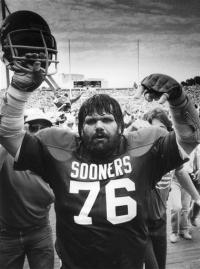
But it was on the wrestling mat where he had the biggest impact, becoming only one of ten four time All-American’s in Oklahoma history and creating some legendary moments, especially during the Bedlam Duals. Williams best national finish was a second place showing at the NCAA tournament in 1981.
Following his collegiate career, Williams tried his hand at football in the USFL, but wound up in professional wrestling, working for another former Sooner, Cowboy Bill Watts, in Mid South Wrestling, which later became the Universal Wrestling Federation.
“Dr. Death” captured the UWF World Heavyweight Title in 1986 and later held the National Wrestling Alliance World Tag Team Championship.
Legal troubles sidetracked his career in the late 1980s, but Dr. Death emerged as a marquee performer in Japan after being seen wrestling the legendary Antonio Inoki in a sold-out match in Texas.
“I was one of the all time culprits in Japan. Every time I went over for a tour, they put my head on a cartoon figure of Godzilla and they would say “Godzilla’s back” and it was kind of neat,” said Williams. “I spent 18 years over there. I guess you can call me half-Japanese. I know how to speak it and eat it; I take my shoes off when I come through the door. I eat with chopsticks. I really enjoyed Japan. It was a wonderful thing.”
“I wrestled Antonio Inoki, he was a senator over there. In fact he was the one who got the Japanese prisoners out of Iraq. I wrestled him in Dallas-Ft Worth in front of probably 40,000 people and I got a deal out of that. It wasn’t a contract, it was a handshake. That’s probably why I stayed in Japan, because every contract I had in the United States has been broken and over there, I had a handshake and my money was sitting in the bank every time I got there.”
Williams bounced back and forth between Japan and the U.S. for the next several years, and even wrestled in one of the first professional events in China.
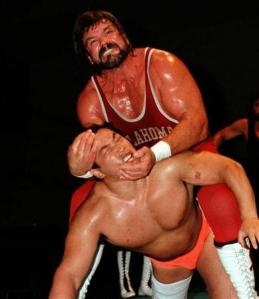
Still a major attraction in his ‘40s, “Dr. Death” ran into the toughest opponent of his career in 2003 when he was diagnosed with throat cancer. An operation was performed that affected his vocal chords and at the time, doctors gave him six months to live. But Williams battled back and has been cancer-free for the last three years.
The incident had a profound effect on Williams’ life. Always known as a wild man and a party animal from his days at OU through his professional wrestling career, “Dr. Death” has changed his ways and is now giving his testimony to groups around the country. With his life in order, Williams is now using his influence to talk to the next generation of wrestlers. He will be giving the prayer at the Fellowship of Christian Athletes breakfast on the opening day of the NCAA Championships in St. Louis and he plans to continue talking about his recovery.
“We have an awesome God. He is just so wonderful. I had throat cancer and they gave me six months to live and as of today, man, I’m three years cancer-free,” said Williams. “I’m wrestling, I’m out in churches ministering. I wrote a book “How Dr. Death Became Dr. Life” and I’m going around the world telling people about how awesome God is. Everybody should get their life right with Him.”
“He gave me a second chance. I do my testimony. I tell a lot of people I used to do it my way because I was so big and awesome and I was on top of the hill and nobody could knock me down. I did it like Ole’ Blue Eyes, Frank Sinatra’s song. I did it my way. In September ’03, I got knocked down to my knees from an opponent named cancer and I knew I couldn’t do it on my own. I asked God into my life and now we’ve become a tag team. He’s conquered cancer for me and now I’m gonna talk to the world telling them how awesome our God is.”
“Dr. Death” has lived in Louisiana for a number of years, but now he is making regular visits to Oklahoma through his association with a local company involved in wrestling, and he was recently honored by the OU wrestling team for his contribution to the Sooner program.
“It was kind of neat that I got to come and be honored by the team and the OU fans, and then come back and see Danny Hodge, Frankie DeAngelis, and some of the older guys, it was really neat,” said Williams. “I hadn’t seen a lot of wrestling matches lately and when I’ve been back in Oklahoma the last month and got to sit down and watch a dual, memories came back like the good old days. The fans that were there supporting it made me feel good and I kinda wish I was an assistant coach for them. I could help them out, you know?”
One thing Williams would like to see is increased support for wrestling in Oklahoma. He is disappointed by the lack of fans at the Sooners matches.
“I never wrestled at the Field House. We were filling them up so big, we always had them at the Lloyd Noble,” Williams said. “I feel sorry for Coach Jack.(Spates). I think wrestling should still be on a pedestal. A lot of people ought to come out and support OU. I went to the Ford Center and watched them wrestle and they beat Arizona State and I thought that was a great match. There are some great wrestlers on that team that have the ability to be NCAA champions and all-Americans”
“I don’t think people realize what wrestling is all about. They don’t know the rules. I think if somebody gets out there and explains the techniques and the point system, people could understand it better. It’s like boxing and anything else. They like to see the big guys go at it. I don’t think people understand the sport and if they understood it better, I think they’d come out and watch.”
When it comes to his days at Oklahoma, Williams has nothing but fond memories of being a Sooner and is still close to his coaches in both football and wrestling.
“Being a football player that helped me with wrestling and wrestling helped me with football. What great coaches I played for – Barry Switzer and Stan Abel – you couldn’t have asked for anything better than that,” said Williams. “Those two guys were like fathers to me. They came to see me in the hospital when I was dying and couldn’t speak, and they spent six hours with me. And I realized that was a turnaround for me. I speak to Barry a lot and Stan.”
“I think it was a blessing to go to Oklahoma and kids, if they ever get a chance, they ought to come to Oklahoma and play. In fact, I have nine rings – three Orange Bowl, one Fiesta Bowl, one Sun Bowl, two Big Eight in wrestling, two Big Eight in football. Those are my pride and joy.”
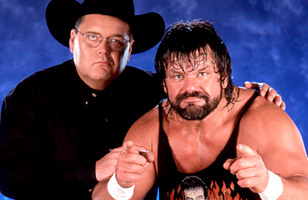
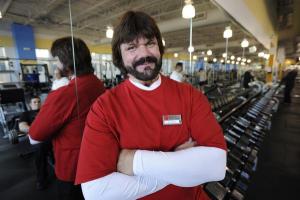
Thank you so much for this article. I was in high school in Colorado when Steve was there. The stories about him were legendary. A guy from my home town wrestled Williams in the State tournament one year and I asked him what it was like. He just shook his head and said, “I can’t even talk about it.” Then he just kind of laughed.
LikeLike
Doc was certainly one of a kind. He squeezed a lot of life out of his short time with us. Thanks for dropping by.
LikeLike